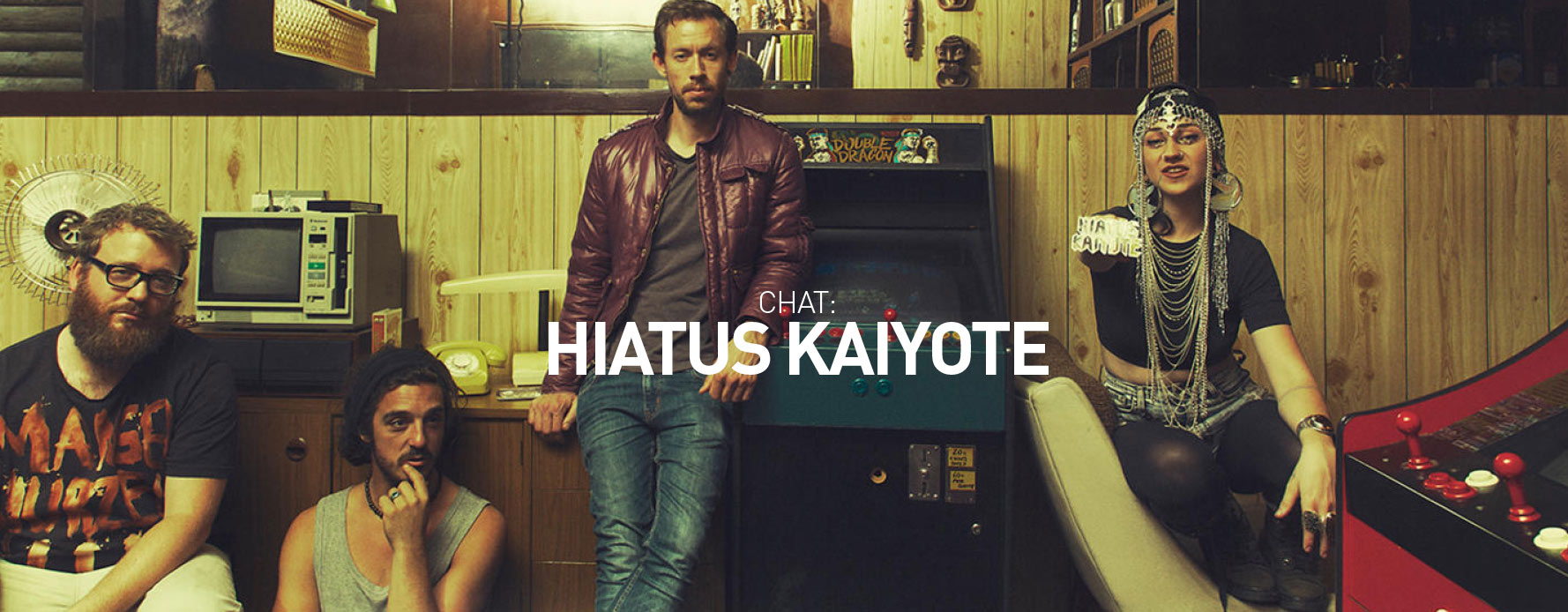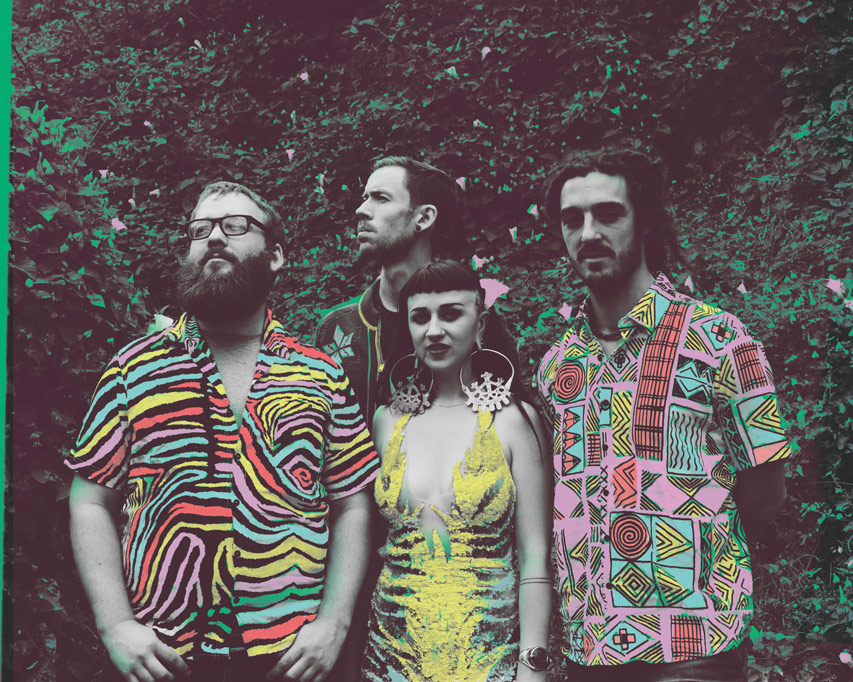Trusting Your Intuition with Hiatus Kaiyote
 Thirsty for JUICE content? Quench your cravings on our Instagram, TikTok and WhatsApp
Thirsty for JUICE content? Quench your cravings on our Instagram, TikTok and WhatsApp

Australian band Hiatus Kaiyote has a sound that is, needless to say, diverse. They reject the boundaries of categorisation and make music as they do – call it ‘future soul’ if you want or you could simply copy their own description of “multi-dimensional, polyrhythmic gangster shit.” JUICE interrupted the Grammy nominated band’s soundcheck at The Bee to quickly speak to Paul Bender and Simon Mavin about possibly emulating the record-making process of The Beach Boys’ seminal album Pet Sounds, the interminable attempt at capturing a certain essence in an album, as well as their deep connection with nature.
Nai and Perrin are not professionally trained, while you guys – Simon and Paul – are trained classically. How was it like when you guys were just starting to jam as a band? Was it awkward at first or was it natural and seamless?
Paul Bender No, it wasn’t awkward. I mean, these guys (Nai Palm and Perrin) have really strong intuition anyway. I consider them pretty highly musically trained because they’ve kinda gone down their own path instead of what Simon and I have done, which is learning everyone’s stuff, you know what I mean? You kinda learn someone else’s music and you do your own thing to it, but those guys are focused on just their own thing. They bring so much to the table, I really like that combination of the intellectual side of comprehending and the intuition of what sounds good.
A few of the songs on Choose Your Weapon was written when Nai Palm was a teenager, was there a lot of rewriting or reworking, or did it remain largely the same?
P I guess when she was writing on the guitar, it was just her and her guitar, you know? Anything that we do with it is always going to be different to that. We’re going to colour everything in our own way. But yeah, some of the tunes are pretty old and some of them, like ‘Fingerprints’ for example, I guess a lot of it is just trying to be faithful to the original format, intention, and feeling of that song. Even though the rest of us come and do our own stuff to a certain song, it’s not like we have to do a really crazy thing to it – it’s always a ‘gut song’.
We saw an interview where you (Paul) were describing your love and your want to emulate Pet Sounds, has that always been the goal with this album?
P I guess there are some things where that came out. ‘Prince Minikid’, that song kinda came out a little bit, some of the sounds, some of the feeling. That process where that album came about was specific, but it’s not exactly one that we follow, I think. It’s the kind of process I like to do in the future—just arranging stuff with a big ensemble and then getting them all to play; doing it live, you know? This album is just a lot of adding things and trying things over a long period of time, loads of overdubs and trying different things and getting rid of things…
Simon Mavin It’s more of an experimentation. It feels like Brian Wilson directed a lot of the Pet Sounds stuff, whereas this is more of an [exploration].
P Yeah, he sort of had it in his head and told everyone what to do.
S Yeah, whereas it is more of a collaboration with Hiatus; we wanna explore. It’s definitely the core understanding of what’s gonna happen in the beginning, but there’s freedom with where you wanna go in the studio, which is hard and good (laughs).
Other than the Australian themes in the album, there are also songs about Japanese anime and video games such as ‘Atari’ and ‘Prince Minikid’, as well as recordings of animal sounds, how do you guys try to unify everything to make it cohesive?
S I don’t think there’s any kind of conscious thought about that. I think it’s more whatever the song is inspired by. It could have been Russian-themed this time, you know? It just happens that a couple of things were Japanese-themed. Again, not many things that we do in the band are planned out, a lot of it is more spontaneous and bouncing [ideas] off each other as opposed to [actually] planning a Japanese manga song – that was never the plan. It was like, “Oh! That reminded me of a Japanese manga song, let’s go down that way.” It could have been anything.
P I think it’s just part of the process of the record and something like you can’t find any more synthesisers because we’re doing all this stuff at home; you kinda have your core track… When it comes to overdubs, you can really explore a lot of synthesisers on this record and there are other songs that aren’t about that video game thing; those sorts of sounds, like those synth-heavy things crept in a lot throughout the album, it definitely gave a unity. It’s a synth record, this one.
Songs like ‘Nakamarra’ and ‘The Lung’ have a lot of Australian references. Is it important to you all to have that strong sense of Australian identity in the band’s material?
P I guess we don’t go all out being super patriotic about it, but at the same time, we really love where we’re from and we recognise that. We love Melbourne—it’s a musical city, but Australia is an amazing place. I guess there is an appreciation for more of the magical, natural elements of Australia, as opposed to… yeah, I don’t know… it’s a weird one.
S Yeah. It kinda relates to the Japanese manga theme. There is no plan to make this [an] Australian thing. Certain things inspire us, and some of those things are Australia (laughs), I guess.
P Sometimes when we’re producing and making stuff, sometimes we think, “Is this part of the ecosystem and [of] different animals?” We draw a lot from sounds that we grow up hearing, like bird sounds, which are unique to where we’re from. There are a lot of animal sounds on the last record too. It’s just a cool element to use and appreciate.
S It’s kinda like subconsciously calming to hear those kinds of sounds in a track.
P When you hear a magpie or something, you sort of know where you are.
Are you guys very in touch with nature… flora and fauna or something? (Laughs)
S (Laughs)
P I mean, I guess we’re not Steve Irwin or anything – or Bear Grylls just going out there and survive or anything.
S We have a definite love for animals and nature, absolutely. We both grew up in those sorts of areas near really beautiful, beautiful nature spots. Yeah, we do have a really strong connection with nature. Like Australia, there’s just so much of it there – untouched, beautiful land, and it’s pretty easy to get to. We all do live in the city now, we’re touring a lot in the last couple of years, I guess there’s a disconnect now, but it’s still there.
P I grew up in a pretty isolated area in Tasmania when I was a kid. There really wasn’t anyone else around except for my family. There’s something about that solitude and just walking around and listening to the environment. I don’t feel as connected now because you grow up and just get busy with shit, you know. You don’t always get that moment of just walking out and be silent and clear your mind. It’s one of those things that every time you do it, you’re sort of like, “Oh yeah, I forgot about this.”
S It’s like taking your shoes off and go standing in grass.
The band’s music is so limitless and varying, which allows you guys to explore and experiment, but having so much freedom, do you think you guys have managed to capture whatever you guys wanted on the album Choose Your Weapon?
P I don’t think we’ll ever do that, I don’t think anyone could truly capture that essence.
S That’s never gonna happen because then you’d just stop playing music. There’s no need for playing anymore, you’d feel like you’ve reached a point. There’s always a sign of an aspiring musician always trying to better themselves, or trying to find something new. It’s an endless journey, it’s never gonna stop.
P I think the best you can do is just to do your best and put the most you can into your art. There are moments of stuff when you create wherein you feel like you’ve tapped into a really good thing, and sometimes it doesn’t turn out as well. It’s hard. I don’t think I’ll ever come close to being 100% satisfied with anything we make.
S We’re slowly gonna become more depressed as our career goes on.
P (Laughs)
Hiatus Kaiyote performed at The Bee, Publika on Thursday 24 September ’15. Catch the band live again at Singapore International Jazz Festival ’16, happening from Friday 4 March ’16 to Sunday 6 March ’16 at Marina Bay Sands. More info here.


 Get Audio+
Get Audio+ Hot FM
Hot FM Kool 101
Kool 101 Eight FM
Eight FM Fly FM
Fly FM Molek FM
Molek FM